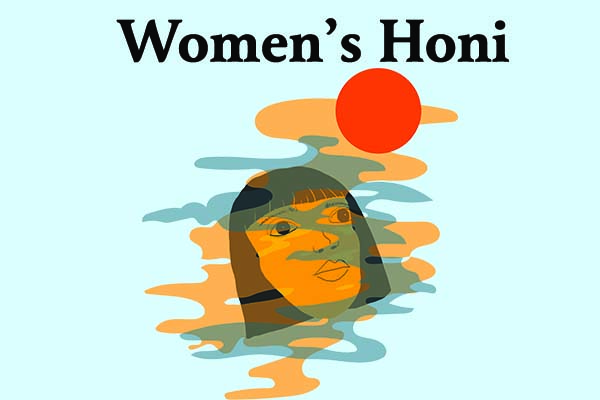“In death we belong to everyone
who can pass our names through their warm mouths,
who can smell the rotten air without flinching,
who can tilt their noses up into the sky and think family.”
— from “Reunion” by Hieu Minh Nguyen
The Balinese cremation ceremony is called ngaben. The whole event is days long, preparation and prayer continuous. There’s a revolving door of kin and the kin-of-kin; mostly a blur of kind faces for someone like me who is not from the village.
The last ngaben I attended, my grandmother’s, was almost five years ago. Her body was encased in a sarcophagus shaped like a fish, itself bound in a luminous ceremonial tower. The whole construction was set ablaze along with offerings of flowers, meat and fruit.
It is hard to look away from fire — how it licks at everything like a dog trying to tend to the wounds of loved ones. The human body is a vessel of water, earth, air and memory until it is no longer. Hieu Minh Nguyen writes, “You can’t uncremate your grandmother,” like I can’t excavate mine with those other bodies that are not like hers or mine, or yours, maybe. She burnt through like tropical fever.
We waited for dust. We sat next to the clearing of the temple, watching the embers and ash rise and fall spinning bright, black and white around us like a new measure of time. Afterwards, we picked through the ashes for the remaining pieces of bone that lay like bleached driftwood in the smoke and decay. Niang’s titanium hip joint, completely intact, was passed around.
****
Over the past months, I’ve felt a kind of haunting. During the worst of the bushfire season, when the smoke devoured the city too, I retreated inside with loved ones to save our breath. In front of doorways and car windows, I squinted at the off-coloured sun. A devil’s nipple, I called it in an Instagram post. And it felt wrong to look at the sun but it could have felt revelatory too. In its Ancient Greek origins, the word ‘apocalypse’ means — not the end of the world — but a discovery, a revelation. Suddenly, we were all looking at something the naked human eye should usually not risk looking at, that which civilisations once assigned to gods and goddesses. It was settler colonisation, greed and environmental mismanagement, not Prometheus, that brought the bushfires.
And it all reminded me of ngaben. It wasn’t just the atmosphere of smoke but it was the thick summer heat too. The kind that cuffs the back of your neck and the back of your arms; stretches across your collarbones, makes breathing hard. It smelt like Bali. Like humidity and the street-side satays cooking out in the open that we pass on the first drive back to the village. Trash heaps on fire. Incense sticks. Cremation.
Ash was falling around me again. Bits of burnt leaf, sometimes. Civilisations of old believed in cyclical time, that regrowth, decay and compost is as inevitable as the return of something you thought you had forgotten — a smell, for example. Some still believe in reincarnation. (Between you and me, I agree that time goes in circles and I’m quite sure it fashions other fabulous shapes as well.)
I don’t know how long it will take for the forests to regrow, for families to recover, after Black Summer swept through and took almost everything. I don’t know how long until the eucalypts can stretch their limbs to each other again and carry life like they once did. And we can’t say when politicians, governing this deluded settler-colonial project, will ever commit to environmental and climate justice. However, the seeds have been planted. Call that reincarnation, call that regeneration, call that revolution.
In her autobiography Speaking in Tongues, Fetwa Malti-Douglas explains a childhood captivated, in part, by the question of death. At her all-girls boarding school, another student taught her a technique that would “generate the smell of death”, a clandestine experiment of sorts. It involved a student curling her right hand into a fist for five minutes, sometimes ten (for better results, apparently). She does not explain what happens next but I suppose the blood rushes to the head. “[W]e young girls were so enamoured by the smell of death when we should have been searching for the smell of life,” writes Malti-Douglas.
But what if the smell of death and the smell of life are the same thing?
****
I have my grandmother’s hands. And maybe her cheekbones too. So, at her cremation ceremony, witness to her naked body washed clean by members of our family and village, rigor mortis rinsed, I thought I was seeing the future. I am holding out hope that by the time my body rests in my own sarcophagus, preventable bushfire seasons are no more. I want this for our future. I want to swim in the ashes of a violent colonial legacy and come back as a flower.





